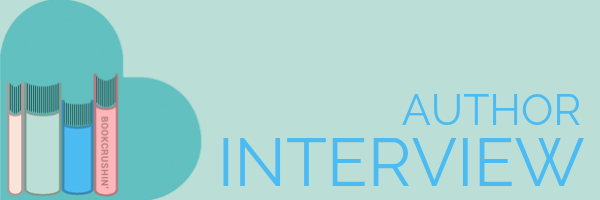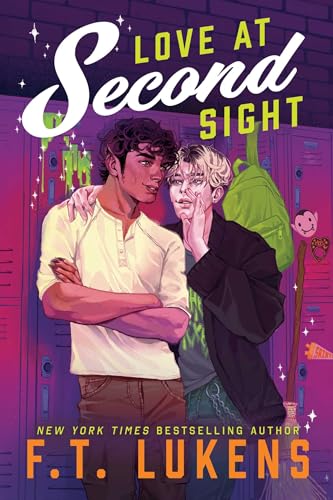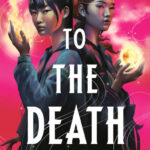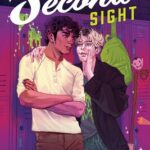
Author Interview: Love at Second Sight by F.T. Lukens
What happens when a quiet, often-overlooked teen suddenly becomes the most clairvoyant person in the room? In Love at Second Sight, author FT dives deep into the messy intersection of power, identity, and visibility through the journey of Cam, a queer teen who doesn’t ask for supernatural abilities, but must learn to navigate the weight of them anyway.
In this interview, FT opens up about how superhero stories like Spider-Man and X-Men helped shape the book’s exploration of agency, what it means to be seen (and safe) as a queer teen, and how knowing just a little can be both a gift and a curse. From Shady Hallow’s supernatural tension to Cam’s moral quandaries, this story isn’t just about psychic visions, it’s about finding the courage to own your power, even when it scares you.
Let’s dive in.

Love at Second Sight
by F.T. LukensPublished by: Margaret K. McElderry Books
on April 29, 2025
Bookshop
Goodreads
When a teen has an unexpected vision about a future murder, he must juggle newfound interest from the supernatural community with trying to prevent the murder from happening in this new romantic fantasy from New York Times bestselling author F.T. Lukens.
Tired of being known as the artsy oddball, fifteen-year-old Cam Reynolds hopes to fly under the radar when he changes high schools as a sophomore. It shouldn’t be too hard, considering he’s a human going to school with kids who have super-cool paranormal powers, like his best friend and witch, Al, and longtime werewolf crush, Miguel.
Then Cam has a psychic glimpse of the future in front of most of the student body, seeing a gruesomely murdered teen girl from the point of view of the killer. When Cam comes to, he knows two things: someone he goes to school with is a future murderer and his life is about to change. No longer a mere human but a clairvoyant, one of the rarest of supernatural beings, Cam finds himself at the center of attention for the first time.
As the most powerful supernatural factions in the city court Cam and his gift, he’ll have to work with his friends, both old and new, to figure out who he can trust. Because the clock is ticking, and Cam and his friends must identify the girl in the vision, find her potential killer, and prevent the murder from happening. Or the next murder Cam sees might be his own.
Interview: Unveiling Love at Second Sight
Love at Second Sight explores how power can suddenly shift a person’s sense of identity and belonging, especially for someone like Cam, who starts out feeling invisible. How did you think about power, agency, and self-perception while building Cam’s journey into clairvoyance?
I have always been a huge fan of the Spider-Man and X-men franchises—both of which largely examine the themes of power and agency within their universes. So, it wouldn’t be a stretch to say that elements of Love at Second Sight were inspired by them.
When I was creating Shady Hallow and the world where the main character, Cam, would inhabit, I thought a lot about what would make the character arc just as dynamic and interesting as the overall mystery plot. I already knew there would be other supernatural characters—like werewolves and witches—so I had to come up with what would create the most tension in the narrative and would allow Cam to examine his sense of self and grow beyond the limits placed on him by the adults around him and the society overall. There are moments in the novel where Cam doesn’t want to be a psychic and is pulled along by what’s happening around him. And there are moments where he has the agency to make pivotal decisions. As the story progresses and Cam becomes to accept the power he has and embraces his psychic self, he starts to grow in his self-esteem, and he becomes more confident in his ability to make informed decisions that alter the course of events leading to the climax of the novel.
This story uses the supernatural as a lens to explore real fears, like being misunderstood, unseen, or not knowing who to trust. How did you approach writing paranormal elements that mirror emotional truths in teen life, particularly for queer teens navigating safety and identity?
Science fiction and fantasy has a long and storied history of examining social issues through the supernatural or fantastical. I’m certainly not the first to do so by any means. As an author, I’ve mostly written queer normative worlds—where a character’s sexual and/or gender identity are accepted without question by the characters around them, even the antagonists. I think that allows queer readers to have a safe space while the narrative explores relatable themes in an allegorical way. It allows the reader to have some distance from the subject but also allows them to interpret the story in a way that is accessible to them and allows them to compare it or apply it to their own experiences.
Cam’s clairvoyant vision throws him into a moral dilemma where he knows too much, too soon, but not quite enough to act clearly. What drew you to this idea of partial knowledge and the tension between fate and free will in how we shape our future?
Most of us are familiar with the adage that ‘a little knowledge is a dangerous thing.’ I thought it would be a fun convention to play around with in a paranormal/supernatural setting. And having a ‘human’ character compelled to solve a mystery with only a little knowledge allowed for a fun group dynamic as he interacted with other characters to gain information and pulled them into the story. There are two adult characters who do point out that what Cam sees is only a small piece in a much larger sequence of events but he doesn’t quite learn that lesson until later in the story.
But what Cam sees does bring up a moral question—how responsible is he for what happens in the vision and is it his responsibility to stop it? Ultimately Cam decides that he does have an obligation to at least alert the person in the vision, if he can find them. And that harkens back to the answer to the first question in relation to Spider-Man. Does power equal responsibility? Cam decides it does, to an extent.
The fate versus free will question is one I struggled with when writing. And it’s a concept I struggled with a lot as a teen coming from a semi-religious background with the doctrine of predestination. If a future is already known—do my decisions matter at all? Are there any decisions that can change the future? Or is free will a con? I don’t want to spoil anything, so I’ll just say that Cam answers this question for himself by the end of the novel.










